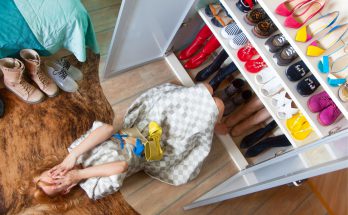I get it. The good feelings that come with new clothes, new shoes, and new jewelry — it hits hard. That good feeling lasts, too: seeing it, finding out it fits, buying it, and wearing it out with friends for the first time. It can make you feel so confident, so happy. I love a good shopping trip, myself — even when my bank account isn’t so excited.
But at what point is being a “shopaholic” a serious problem? At what point do you have a shopping addiction and need help addressing it?
Here’s what a couple of addiction therapists had to say.
A shopping addiction is a thing
Shopping can indeed be an addiction. Magda Evans, resident in counseling at Thriveworks in Lynchburg, VA, explained how it works.
“Activities that humans find pleasurable, including shopping, can activate the neurotransmitter dopamine, which leads to feelings of pleasure,” she said. “Tolerance can be built, which means it would take more and more stimulation to release dopamine, which can lead to addictive behavior.”
What to look out for
So what are the signs?
“Similar to any other type of addiction, shopping addiction is a pervasive condition in which one continues to engage in unhealthy behaviors despite personal and social consequences,” said Matt Glowiak, PhD, LCPC, a therapist with Choosing Therapy. “In this case, an individual struggling with [a] shopping addiction may find oneself constantly thinking about and spending increasing amounts of money on unnecessary things.”
He explained people with a shopping addiction experience a short-lived euphoria while shopping. They also typically endure withdrawals after, in which they regret the purchase but have an urge to shop more.
Some additional signs, according to Evans, include:
● Buying things to make yourself feel better emotionally
● Impulsive purchases
● Difficulty or inability to resist shopping or purchasing something that’s not needed
● Shopping and making purchases that lead to financial issues
● Developing problems with relationships or other areas of life due to shopping
The rabbit hole of a shopping addiction
While a shopping addiction may start off somewhat innocent at first, people can quickly spiral. “What may begin as moderate spending may quickly turn into spending of savings, selling personal property, taking out loans or credit card debt, or even declaring bankruptcy,” Glowiak said.
While a shopping addiction has negative financial impacts, it can also affect a person’s relationships. “With so much time spent focused on buying things, individuals neglect other significant others in their lives, such as partners, parents, children, friends, colleagues, and others,” he continued.
Which, in turn, can leave a person without relationships — and potentially without a job. “In cases where one has resorted to borrowing or stealing without repaying, loved ones suffer socially, emotionally, and financially. Consequently, those struggling with shopping addiction may begin isolating themselves or being blacklisted from social groups,” Glowiak said. “In other cases, people are terminated from work.”
This may quickly become overwhelming. However, you can still have hope.
Many small changes can help
While a shopping addiction can be hard to beat, Evans shared several helpful ideas. “For example, if one were to stop using credit cards and use cash instead, it can prevent impulse buys. Creating a shopping list to reference may also be helpful,” she said. “Along with this, it is important to be aware of the difference between items that are ‘wants’ and those that are ‘needs.’”
Online shopping can be especially tempting since it’s so dang easy, but you can make changes there, too. “If shopping online, click ‘save for later’ to allow time to pass to reflect on making the purchase before immediately doing so. Along with this, removing any linked card numbers or payment accounts can help, as it will not be convenient and easy to make purchases,” Evans recommended.
And as with any mental health struggle, leaning on loved ones and professionals for support is a great idea. “If possible, have a friend or family member shop with you to help you reflect on the items to help prevent impulsive purchases,” Evans said. “Since shopping addiction usually co-occurs with other mental health disorders or low self-esteem, it may be helpful [to talk with a therapist] for the long-term to address the underlying roots and reasons that have led to a shopping addiction.”
Evans then suggested finding other hobbies and coping strategies to help you recover. This can include a form of enjoyable exercise, an artistic craft, “The Bachelor” nights with friends, and so much more.
Additionally, some considerations Glowiak suggested include avoiding shopping triggers, setting a budget, putting the rest of your money in savings, and being conscious of your money.
“Simply stated, ‘If you don’t have it, don’t spend it,’” he said.
He also emphasized seeking professional help. “The more significant the problem, the more likely professional help is needed,” he recommended.
Don’t be too hard on yourself
Having self-compassion during this time is also so important. Realize the societal factors that play a role, and don’t beat yourself up.
“With social media and the frequent use of smart devices, it is easy to become overwhelmed by all of the marketing and advertisements. Consumerism is very predominant, and it is no wonder that some people develop a shopping addiction,” Evans said.
Glowiak commented on this, too. “Mass media preys on the vulnerabilities of others through various advertising schemes that are becoming more individualized,” he said. “The more connected we feel to a potential purchase, the more likely we are to buy.”
While keeping these pieces in mind, try out some of the tips above, too. Remember, you can recover from your shopping addiction and live a happier life.



